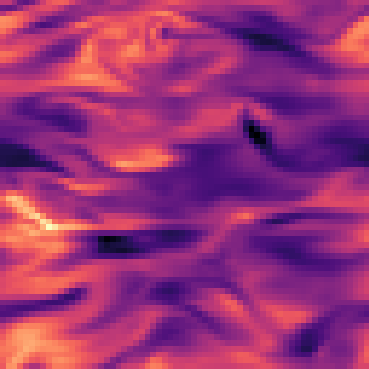Datasets:
The dataset viewer is not available because its heuristics could not detect any supported data files. You can try uploading some data files, or configuring the data files location manually.
This Dataset is part of The Well Collection.
How To Load from HuggingFace Hub
- Be sure to have
the_wellinstalled (pip install the_well) - Use the
WellDataModuleto retrieve data as follows:
from the_well.benchmark.data import WellDataModule
# The following line may take a couple of minutes to instantiate the datamodule
datamodule = WellDataModule(
"hf://datasets/polymathic-ai/",
"MHD_64",
)
train_dataloader = datamodule.train_dataloader()
for batch in dataloader:
# Process training batch
...
Magnetohydrodynamics (MHD) compressible turbulence
NOTE: This dataset is available in two different resolutions for MHD_256 and for MHD_64. The data was first generated at and then downsampled to after anti-aliasing with an ideal low-pass filter. The data is available in both resolutions.
One line description of the data: This is an MHD fluid flows in the compressible limit (subsonic, supersonic, sub-Alfvenic, super-Alfvenic).
Longer description of the data: An essential component of the solar wind, galaxy formation, and of interstellar medium (ISM) dynamics is magnetohydrodynamic (MHD) turbulence. This dataset consists of isothermal MHD simulations without self-gravity (such as found in the diffuse ISM) initially generated with resolution and then downsampled to after anti-aliasing with an ideal low-pass filter. This dataset is the downsampled version.
Associated paper: Paper
Domain expert: Blakesley Burkhart, CCA, Flatiron Institute & Rutgers University.
Code or software used to generate the data: Fortran + MPI.
Equation:
where is the density, is the velocity, is the magnetic field, the identity matrix and is the gas pressure.
| Dataset | FNO | TFNO | Unet | CNextU-net |
|---|---|---|---|---|
MHD_64 |
0.3605 | 3561 | 0.1798 | 0.1633 |
Table: VRMSE metrics on test sets (lower is better). Best results are shown in bold. VRMSE is scaled such that predicting the mean value of the target field results in a score of 1.
About the data
Dimension of discretized data: 100 timesteps of 64 64 64 cubes.
Fields available in the data: Density (scalar field), velocity (vector field), magnetic field (vector field).
Number of trajectories: 10 Initial conditions x 10 combination of parameters = 100 trajectories.
Estimated size of the ensemble of all simulations: 71.6 GB.
Grid type: uniform grid, cartesian coordinates.
Initial conditions: uniform IC.
Boundary conditions: periodic boundary conditions.
Data are stored separated by ( ): 0.01 (arbitrary units).
Total time range ( to ): , .
Spatial domain size ( , , ): dimensionless so 64 pixels.
Set of coefficients or non-dimensional parameters evaluated: all combinations of {0.5, 0.7, 1.5, 2.0 7.0} and {0.7, 2.0}.
Approximate time and hardware used to generate the data: Downsampled from MHD_256 after applying ideal low-pass filter.
What is interesting and challenging about the data:
What phenomena of physical interest are catpured in the data: MHD fluid flows in the compressible limit (sub and super sonic, sub and super Alfvenic).
How to evaluate a new simulator operating in this space: Check metrics such as Power spectrum, two-points correlation function.
Please cite the associated paper if you use this data in your research:
@article{burkhart2020catalogue,
title={The catalogue for astrophysical turbulence simulations (cats)},
author={Burkhart, B and Appel, SM and Bialy, S and Cho, J and Christensen, AJ and Collins, D and Federrath, Christoph and Fielding, DB and Finkbeiner, D and Hill, AS and others},
journal={The Astrophysical Journal},
volume={905},
number={1},
pages={14},
year={2020},
publisher={IOP Publishing}
}
- Downloads last month
- 66
